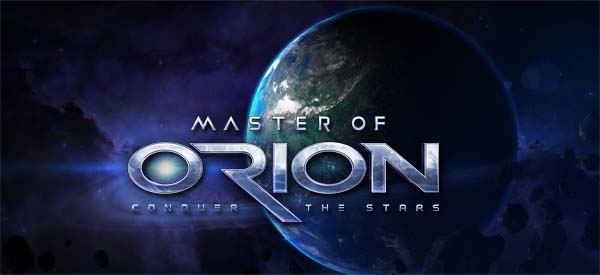
The 2016 reboot of Master of Orion kind of shoots itself in the foot a bit with its own subtitle: "Conquer the Stars". When I play 4x games, I like to feel like I'm really building an empire, managing an economy, and conducting diplomacy. All of those things are present in Master of Orion, but I've gotten a pretty distinct feeling that this is yet another strategy game that falls victim to military rushing being the optimal strategy by far. Master of Orion doesn't really want you to build a civilization and colonize the galaxy; it firmly wants you to do what its subtitle tells you: conquer the stars.
Master of Orion III was kind of shit (it was boring, ugly, and completely lacked personality and substance), but at least it made some effort to be new and interesting. Most noticeably, the galactic map was actually three-dimensional. Sure, this was a navigational and UI nightmare for the human player, but it required players to think differently about how they approached expansion and warfare. At a more fundamental level, MoO3 sought to be a game about macro-management, asking the player to manage a vast galactic empire rather than just a collection of a dozen or so planets. The meat of the game, thus, was intended to be in the mid-to-late stages, as developed empires engaged in epic battles for survival, rather than all the fun and challenge being front-loaded in the early rush to colonize all the nearby planets. It didn't work, but at least it was trying to genuinely innovate the 4x genre.
The new Master of Orion isn't anywhere near that ambitious, and seeks instead to simply bring the original Master of Orion concept (in its simplest form) into the age of high-resolution 3-d graphics. It's a scaled-down, bog-standard space-4x game that borrows heavily from Endless Space and Civilization V. But it is at least a competent one!
Conquer the Stars isn't as big, complex, or ambitious as Master of Orion 3, but at least it's competent.
The galaxy itself isn't very big this time around. Depending on the map's size, there's only a few dozen stars, and most of them only have two or three planets. Unstable star lanes and space monsters can lock you out of exploring certain systems until you research certain technologies or grow your military sufficiently large (respectively). Other than that, exploration is over fairly quickly (especially once you start performing map trades in diplomacy).
Planet-management is also fairly easy. You can assign population meeples between one of three different types of output: food, production, and research. Meeples of different jobs and races have different icons, and unhappy meeples on strike have icons that sit down holding a picket sign. It makes it very easy to see what your population's current status is at a glance. There's just not really much to do with them. You don't have to assign them to work specific buildings, and with only 3 outputs to manage, balancing or specializing isn't that difficult.
All the buildings in the game are also one-time builds that don't serve much function other than to provide flat points of one of the three outputs, or to modify the efficiency of meeples in a particular output category. Buildings that have unique functionality (such as the Spy Center, Gravity Generators, or Interplanetary Administration) are few and far between. The only other thing that you do with your planets is to occasionally terraform them in order to boost your max population and unlock additional slots along each of the output tracks.
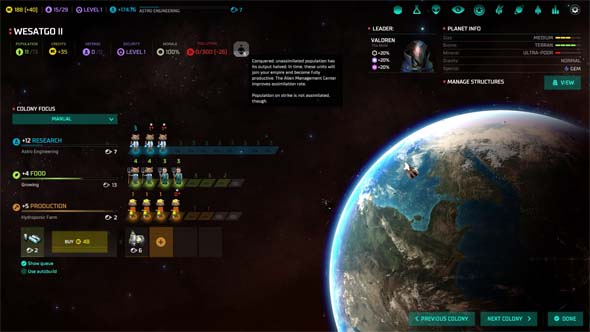
Each point of population is of a specific race, which affects the morale of conquered planets.
The tech tree also feels kind of bland and linear. I would much prefer a tech web along the lines of Civilization: Beyond Earth. Master of Orion kind of goes in this direction a bit by including some techs in which you have to chose which of two different items you want to take when you research certain techs. You can then trade for the other via diplomacy if you want to. It's kind of like the leaf nodes in Beyond Earth, but only some techs have them, and I rarely had to think too hard about which one I wanted... [More]
b529f082-d6e2-4759-8316-2633e3e77143|0|.0
Tags:Master of Orion, Master of Orion: Conquer the Stars, NGD Studios, Wargaming Labs, Steam, strategy, grand strategy, 4x, turn-based strategy, PC, science fiction, space, exploration, expansion, exploitation, extermination, colony, war, Michael Dorn, John de Lancie, Mark Hamill, Alan Tudyk, Nolan North, meeple, Master of Orion 3
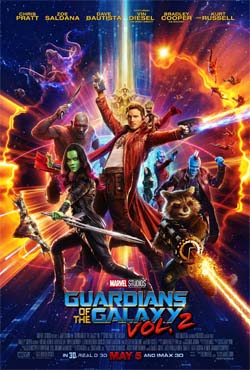
What are the two biggest, most consistent weaknesses of the Marvel movie franchises? Well, they have a lot of trouble with direct sequels -- the sole exception being Captain America: Winter Soldier (why, oh why did I never review that movie?!). They also have a lot of trouble with villains -- the sole exception probably being Loki. I'd also throw in a third weakness, which would be the over-reliance on McGuffins to carry the plot.
Well, Guardians of the Galaxy Vol. 2 actually manages to avoid all three of those Marvel pitfalls!
Vol. 2 gets around the sequel slump by slowing things down a bit so that it can be a more character-driven story. For the majority of the film, the stakes are set pretty low and personal, and each character gets a chance to be an actual character rather than just an action hero. The main plot revolves around Starlord connecting with his long-lost father, only to discover (almost too late) that said father is actually a supervillain, and that he didn't realize that he had another father figure right there beside him the whole time. That's a great setup. But I almost feel like Starlord and the rest of the Guardians crew feel more like the B-Story here, because this movie feels like it's more about Yondu than about Peter Quill, Gemorah, or any of the main cast. But that might be partly because the entire cast gets such a balanced amount of screen time, and no one character or plot thread dominates the others.
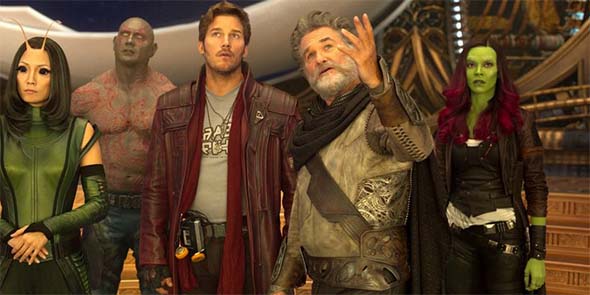
This movie operates on a smaller scale, with a more personal conflict -- at least initially.
Despite the frequent cuts and the presence of almost half a dozen individual plot threads, the movie is remarkably tightly-themed. Virtually every plot thread in the film revolves around family. Quill meets his father. Gemorah finally gets to understand her sister. Rocket is dealing with raising Baby Groot and confronts his own inability to stop being an asshole long enough to let anybody actually like him. Drax is being repeatedly reminded of the loss of his own family. And Yondu is dealing with the feeling that he's a failure in the eyes of anybody who he ever might have considered "family".
This family-centered core of the movie then manages to help resolve the second major issue with Marvel movies. Vol 2 actually has a pretty interesting and mysterious villain... [More]

I did it again. I waited until the last minute to see a hard science fiction film until it was just about to leave theaters, even though I complain about the conventional Hollywood logic that hard science fiction doesn't sell tickets. In my defense though, I was preparing for a trip out of the country when this movie released. So my excuse this time is far better than my excuse for missing opening weekend of The Martian. And once again, this film's 94% on Rotten Tomatoes (as of the time of this writing) and its exceeding box office projections (coming in third behind a Marvel comic book movie and a children's movie) seems to vindicate that Hollywood can still make high-concept, hard science fiction films, that people will go see them, that people will understand them, and that those people will like them.
Arrival is as hard as hard science fiction gets. Think Contact; think 2001: A Space Odyssey; think the Star Trek TNG episode "Darmok". Arrival is all about communication, and it offers an interesting exploration of how language influences the way that we think, and how our thoughts are filtered through the language that we speak. The entire movie is about the efforts to communicate with the aliens, while human beings progressively become incapable of actually communicating with one another. There's no real villain, exactly one explosion, and the threat of China and Russia starting a war with the aliens on the other side of the globe is a distant, but tangible threat. This film is slow and methodical, much like the efforts to teach a new language to someone, and it makes absolutely sure that the audience will be able to follow along with what is going on.
Moreso than our attempts to communicate with aliens, this film is about our ability (or inability) to communicate with each other - at every level of society. From individual relationships, to professional relationships, to political relationships, to international diplomatic relationships, and even the relationship between the media and the public.
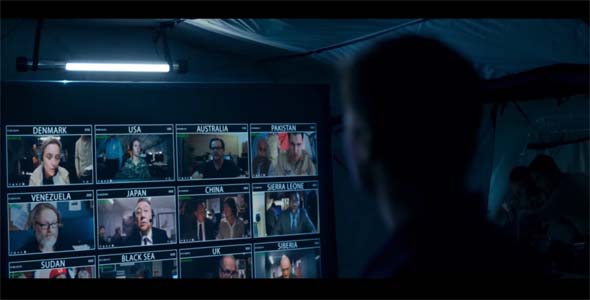
Arrival is more about our inability to communicate with each other, than our inability to communicate with aliens.
It's difficult for me to say anything more about this movie without absolutely, completely spoiling everything. Suffice to say, the high-concept science fiction stuff is very well handled. This movie earns some comparisons to Interstellar, but is far more intelligent and manages to not be hokey at all. Read on if you want spoilers... [More]
023940cc-6fc7-4a26-a273-727d7283c24d|0|.0
Tags:Arrival, Amy Adams, Jeremy Renner, science fiction, grief, extraterrestrial, language, communication, relationships, Slaughterhouse-Five, Kurt Vonnegut, time travel, box office, Hollywood
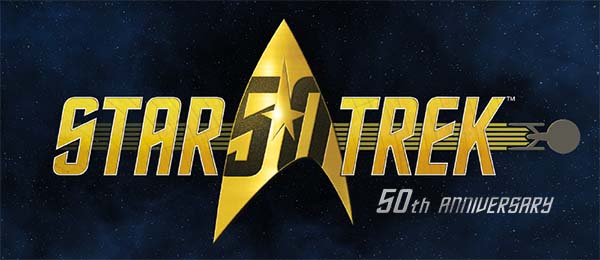
On September 8, 1966, a cultural revolution started. The first episode of a new science fiction television series named Star Trek premiered on NBC. This series broke new ground in the genre of science fiction by being one of the first series ever to present high science fiction concepts to television audiences, while also using its space adventures as allegories for contemporary social and political issues. While it presented itself as mindless space adventure in the same vein as Buck Rogers and Flash Gordon, it took a serious approach to science fiction that (at the time) was limited to literature like the novels of H.G. Wells and the stories of Isaac Asimov.
Star Trek wasn't the first serious science fiction television series. Shows like The Twilight Zone and The Outer Limits had existed for a almost a decade. But Star Trek differed from these series in that it depicted a revolutionarily positive and uplifting version of the future of humanity during the height of the paranoia of the Cold War. Humanity, according to Star Trek would overcome the threat of mutual destruction that the Cold War between the United States and the Soviet Union posed, and we would come out the other side with a spirit of cooperation and a desire to peacefully and benevolently explore the stars, exploring strange new worlds and seeking out new life and new civilizations.
Television science fiction was dominated by childish adventures like Buck Rogers
and more cynical anthology series like The Twilight Zone that drew off of Cold War paranoia.
The show was created by Gene Roddenberry, a former United States army air force pilot and Los Angeles police officer who eventually found his calling as a television writer and producer. He wrote and produced some police dramas and westerns before pitching his defining project: Star Trek. The show was picked up by Desilu Productions, a company that was run by Lucille Ball (yes, the titular actress of I Love Lucy) and her husband. The production of Star Trek was tumultuous. The show was canceled by NBC after its second season, only to be revived due to an unprecedented, fervent letter-writing campaign staged by its fans. It did not survive its third season, however, as Desilu Productions was rapidly running out of money, was forced to cut budgets, and NBC moved the show to the dreaded Friday night "death" slot. In an age before DVRs, or even VCRs, if people were out on the town on a Friday night, and they missed an episode of a show, then that episode simply went unseen.
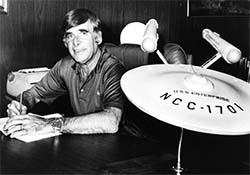
Gene Roddenberry's optimistic vision
of the future remains endearing.
The series eventually saw tremendous success after its cancellation due to its episodes being syndicated during the 1970's. It gained a cult following that grew and grew, setting up conventions that would come to draw thousands of attendees. Though not immediately apparent, Star Trek would grow to become one of (if not the) most successful science fiction properties in the world. The series is often cited by scientists, engineers, and astronauts as their inspirations for their careers, and the technology of the series has inspired many real-world technological innovations, such as wireless communication, mobile devices (in particularly mobile phones), speech-recognition software, and so on. Roddenberry became the first TV writer to receive a star on the Hollywood walk of fame, has been inducted into the Science Fiction Hall of Fame and the Academy of Television Arts & Sciences Hall of Fame, and was one of the first human beings ever to have his ashes carried into earth orbit... [More]
a36b33e8-1404-42b1-9723-a4759be0acee|2|5.0
Tags:Star Trek, Star Trek: the Next Generation, Star Trek: Deep Space Nine, Star Trek: Voyager, Star Trek: Enterprise, Star Trek: Discovery, Star Trek VI: the Undiscovered Country, Star Trek: Beyond, birthday, anniversary, science fiction, allegory, humanism, humanist, Gene Roddenberry, NBC, CBS, Fox, Paramount, Desilu Production, Lucille Ball, Cold War, Balance of Terror, The Measure of a Man, Kirk, Spock, Data, Gul Dukat, Seven of Nine, Star Trek the Experience, Las Vegas, Wallace Shawn, Grand Nagus Zek

After experiencing some annoying performance issues on the PS4 version of Dark Souls III (including a framerate capped at 30 fps), I decided that I'd hold out the extra three days for the PC version of No Man's Sky. I assumed that the keyboard and mouse controls would be more comfortable, since the game is half shooter, half flight-sim. I assumed that the PC version would perform better and look better. And I figure that the game will eventually enjoy a vibrant modding community that is likely impossible to spring up on the PS4, since (as far as I know) the PS4 does not support modding in any way. I, once again, may have been wrong in my choice of platform
In addition to having to wait three extra days for the game to release on PC, I've read a lot of reports of severe problems with the PC version of the game at launch. It simply won't run on certain machines with certain graphics cards. Many rigs have consistent performance issues. My PC is a few years old, but it more than meets the system requirements for the game, yet I've been stuck having to run it on medium graphics settings. Upping the settings to high only results in the game becoming unplayably slow whenever I step into the cockpit of my ship. I'm talking, like half a frame per second, and the game dropping all my inputs. The final insult is that the game breaks when you alt-tab out of it, which prevents you from alt-tabbing back into it. If you alt-tab out, you'll have to kill the process in task manager and restart the app - which, of course, will cause a loss of any progress since the last autosave. So despite having a dual-monitor set-up, I can't alt-tab out to open up podcasts or play some tunes while I warp around the galaxy.
Most of these problems will likely get fixed at some point (and some of them already have), and hopefully I'll be able to run the game at high graphics settings. But in the meantime, if you're interested in playing the game, then the PS4 version is probably the technically superior one right now. Apparently, the PS4 version also has numerous performance issues, including crashes.
Sadly, technical problems are only the beginning of my complaints with this game.
Betraying the naturalist within
Instead of being a game about exploring strange new worlds and discovering exotic wildlife and natural wonders of the universe (as I'd hoped), No Man's Sky turns out to be quite the opposite: a game about conspicuous consumption. The core game loop does not consist of landing on an alien world to explore and catalog the local flora and fauna. Instead, you land your ship in a vibrantly-colored patch of minerals and plants, and you begin strip-mining the site clean. You harvest the raw materials that you'll use to refuel your space ship so that you can warp to the next planet to strip its resources for more fuel.
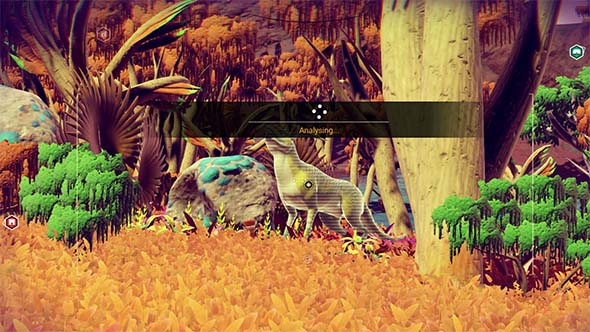
The incentives to catalog alien life feel extrinsicly-imposed and not a natural part of the core game experience.
Actually seeking out and cataloging the local wildlife takes a backseat - if you even bother to do it at all. The game isn't about that. There's nothing in the core gameplay loop or narrative that actually sets the game up to be about cataloging alien life. The only reason that the player has to even bother with scanning and analyzing is because you're rewarded with in-game currency for scanning stuff, even though there's no in-game reason (that I could discern) for why you would be getting paid to catalog alien life or who it is that's putting the money in your account. It all feels so thoroughly divorced from the rest of the game, and the money feels like an extrinsic incentive that is imposed from outside the scope of actual gameplay. In fact, I don't know why the game would have an in-game reason for why you would get paid to catalog stuff. After all, these planets are all already known by somebody in the game universe - they have space stations in every star systems and colony modules and trading posts on every planet long before you ever get there to "discover" them. So not only does cataloging life feel like an extrinsically-imposed mechanic, even this process of "discovering" feels completely fake and artificial... [More]
014d7ec0-67ee-4a6d-aaf4-03269c447640|5|3.8
Tags:No Man's Sky, Hello Games, Sony, PlayStation 4, PS4, Steam, PC, procedurally generated, science, dinosaur, animal, evolution, geology, astronomy, cosmology, science fiction, exploration, discovery, harvest, crafting, space, warp drive, Skinner Box, casual gaming, mobile gaming, Spore
|

| 12 | | | | | | | 60 | | 11 | | | | | | | 55 | | 10 | | | | | | | 50 | | 09 | | | | | | | 45 | | 08 | | | | | | | 40 | | 07 | | | | | | | 35 | | 06 | | | | | | | 30 | | 05 | | | | | | | 25 | | 04 | | | | | | | 20 | | 03 | | | | | | | 15 | | 02 | | | | | | | 10 | | 01 | | | | | | | 05 |
|